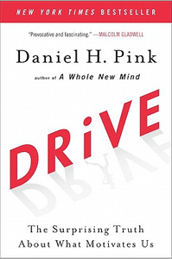 According to recent Gallup study, businesses with high levels of employee engagement are 21% more productive and 22% more profitable than those with low employee engagement.
According to recent Gallup study, businesses with high levels of employee engagement are 21% more productive and 22% more profitable than those with low employee engagement.
Daniel Pink’s Drive: The Surprising Truth About What Motivates Us introduced me to the social science behind engagement through intrinsic motivation, but it also validated many of the instincts I’ve had in pursuing a Conscious Business model. Success in the Knowledge Economy relies on maximizing employees’ creativity and problem solving, something that can’t be accomplished through the old carrot-and-stick method: it’s almost impossible to punish a lack of creativity, or to incent it through bonuses. In the book, Pink quotes a study done by the business consulting firm McKinsey & Co. showing that 70% of US job growth is heuristic, meaning that it involves problem solving and trial-and-error; routine jobs are easily outsourced or automated.
Pink lays out three pillars of intrinsic motivation: autonomy, mastery and purpose.
Autonomy -- It’s important to clarify up front that I am not encouraging some kind of radical trust where people do anything they want, following whatever they view as being the best interests of the company. That would be chaos. What I advocate is an an environment where the business mission, goals, and objectives are well spelled out. Fred Kofman calls this “impeccable coordination,” and at Credo we seek to accomplish this type of organizational alignment through our use of the Gazelles Framework. We bring each department together with the leadership team to explore the next year’s or quarter’s direction, set clear objectives and agree on key performance indicators. This has the combined benefits of being a transparent and collaborative process that also puts everyone on the same page moving forward, allowing leadership to step back and let people work with minimal interference in their day-to-day. We then measure how team members feel about their autonomy by asking in our annual culture survey if they feel trusted to do their work. This has consistently been an area of high scoring.
|
|
| © Photo by Russ Hendricks, ToolsAreHome.com |
Mastery -- This is the almost philosophical disposition some people have in their desire to continuously work to perfect their skill level, like an apprentice working over time to learn the skills of a master craftsperson. While I don’t see this as being solely the responsibility of the business, there are certainly ways a company can foster an environment where this kind of mentality can thrive. Career and advancement paths should be designed with employees’ desired interests and goals in mind. We engage in a dialogue identifying the intersection between what people want to do for work, where their strengths lie and what the business needs are.
Purpose -- We all certainly need to make an income, and businesses need revenue, but true engagement at work happens when there is a purpose beyond money for everyone to work toward. At Credo we try to develop a sense of purpose on three levels. First, at the individual level, we care that people are co-creating jobs that are meaningful to them. The second, or operational level, defines a large mission we pursue collectively, like helping libraries redefine their place in the 21st century and promoting information skills as a way to empower people to become effective lifelong learners. Finally, on a philosophical level we’re building a company in which all stakeholders experiences themselves as well-served. We see this as a noble purpose and want to ignite people’s passions to be part of this cause!
We continuously seek to maximize fit between employees and the company by encouraging autonomy, mastery and purpose. This requires flexibility on the part of the company and a growth-orientation on the part of the employee. To the extent we achieve this, we believe this forms the foundation of our long-term success.
Further reading:
- Pink, D. H. (2009). Drive: The surprising truth about what motivates us. New York, NY: Riverhead Books. (Image of book jacket from: http://www.danpink.com/books/drive)


